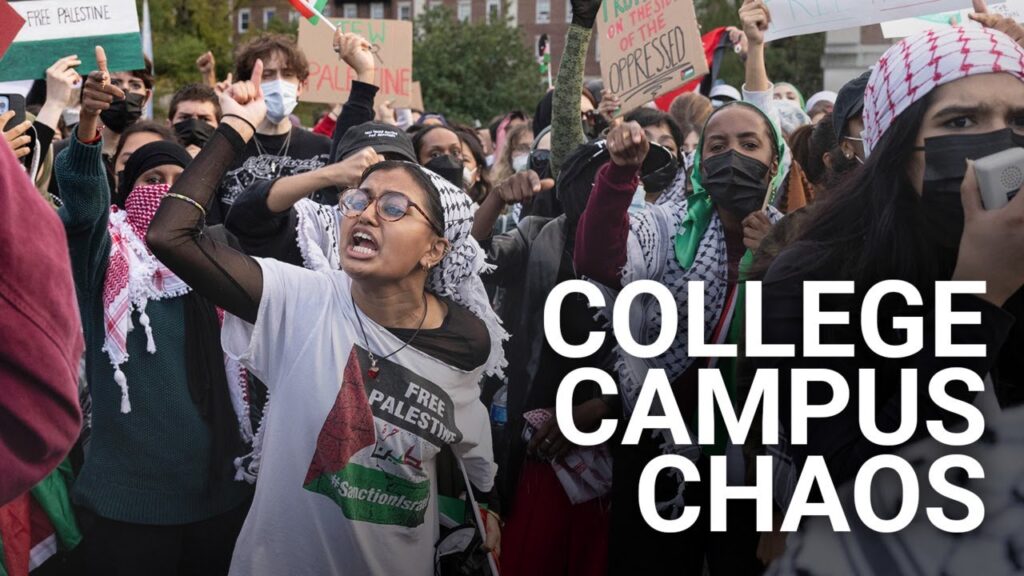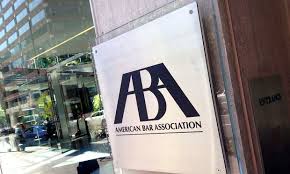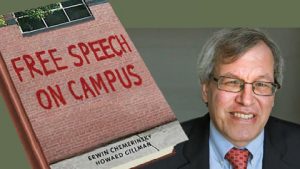The ABA’s Free Speech Intervention
Legal academia finds itself peering into the abyss of leftist orthodoxy, in which dissent is forbidden. Ironically, the liberal American Bar Association may save once-respected law schools from themselves.
A slightly-edited version of this essay was originally published by The James G. Martin Center for Academic Renewal on January 17, 2024 (here). Thanks to Real Clear Policy (here), Instapundit (here), National Review (here), Real Clear Education, Legal Insurrection (here), Princetonians for Free Speech (here), and Tax Prof Blog (here)!
Higher education did not have a good year in 2023, as evidenced by the high-profile resignations of Ivy League college presidents at Penn (Liz Magill) and Harvard (Claudine Gay) following their abysmal televised congressional testimony–refusing to condemn campus calls for genocide against Jews! (Harvard’s disgrace was compounded by revelations of serial acts of plagiarism on the part of Gay.)

The legal academy has fared no better in recent years, with highly-publicized incidents of intolerance, de facto censorship, and speech suppression at Stanford Law (students heckling Fifth Circuit Judge Kyle Duncan), Yale Law (disruption by students of an event featuring Alliance Defending Freedom general counsel Kristen Waggoner, and administration harassment of a Federalist Society member for promoting a Constitution Day event), Georgetown Law (suspension of lecturer Ilya Shapiro for a tweet criticizing President Biden’s selection of Judge Ketanji Brown Jackson to serve on the U.S. Supreme Court), and Penn Law (disciplining tenured faculty member Amy Wax for making unpopular statements).

Some federal judges (including Fifth Circuit Judge James Ho and Eleventh Circuit Judge Elizabeth Branch) have indicated that they will stop hiring law clerks from offending schools until the repressive campus culture is fixed. Some law firms have withdrawn job offers from anti-Semitic students who, emboldened by a campus climate imbued with cultural Marxism, harassed or threatened Jewish (or pro-Israel) students based on their perceived status as “oppressors” or “colonizers.” The shocking display of pro-genocide sentiment at many colleges and law schools unmasked the toxic core of “intersectionality,” and prompted America’s largest law firms to issue an unprecedented joint letter to top law schools warning them that the firms will not hire graduates who engage in “discrimination or harassment” against Jewish students.
The law firms scolded the law school deans with a tone reminiscent of a parent correcting misbehaving children: “As educators at institutions of higher learning, it is imperative that you provide your students with the tools and guidance to engage in the free exchange of ideas, even on emotionally charged issues.” This was a humiliating smackdown for legal academia. Elite law schools used to provide entrée to jobs with prestigious law firms and sought-after clerkships with federal judges. When the maladministration of these expensive institutions foreclose—rather than enhance–career opportunities for their graduates, legal academia must acknowledge it faces a serious problem. A crisis, even.
Sadly, this is only the tip of the iceberg. Many law schools have become left-wing echo chambers, unwilling to permit the expression of viewpoints contrary to the woke orthodoxy. Have the cancel culture and identity politics stifled free speech on law school campuses? Has the woke obsession with “diversity, equity, and inclusion” extinguished the free exchange of ideas among law students and faculty? At many law schools, the only honest response to these questions is “yes.”
Ideological conformity, enforced through speech codes and “anti-bias” policies, has made robust intellectual discourse problematic—even impossible—at our leading law schools, where debate is essential. Northwestern University law professor John McGinnis has observed that law schools “have become ideologically and structurally committed to the Left, especially on issues of race and gender. Since the new ideology of race and gender claims to affect almost everything, almost everything that law schools do is now distorted; the freedom of speech and inquiry that makes the adversary system work for society’s benefit is threatened.” (Emphasis added.)
With justification, critics charge that the “illiberal takeover of higher education…manifests in the shifting and narrowing of the range of permissible views, such that everyone on campus walks on eggshells and is unable to discuss certain ideas. University officials placate, facilitate, and even foment mobs that can’t be reasoned with.” Is this a sound pedagogical model for training lawyers bound to advocate zealously on behalf of clients in complex and sometimes bitterly-controversial disputes? Will tomorrow’s lawyers be able to discharge their important role if they have been taught that tantrums and bullying are an acceptable substitute for reasoned argument? Plainly, the answer is “no.” Legal academia is at a dire inflection point.

To its credit, the American Bar Association, responsible for accrediting the nation’s law schools for purposes of eligibility for federal student loans and graduates’ bar admissions, is considering a proposal (sponsored by the ABA’s Council of the Section of Legal Education and Admissions to the Bar) that would require law schools to adopt policies protecting the free speech rights of faculty, staff, and students; prohibiting disruptive conduct interfering with free expression (such as the “heckler’s veto”); and providing for due process for those accused of violating the policy.
The ABA’s accreditation rules carry great weight because law schools that do not comply face the loss of their accreditation—in effect, capital punishment. Law schools cannot ignore the ABA when accreditation is at stake, and the ABA knows it.
This proposal, which has been endorsed by free speech advocate and well-known legal scholar Erwin Chemerinsky, Dean of UC Berkeley Law School (and past president of the influential Association of American Law Schools), will be considered by the ABA’s House of Delegates at its February 5 meeting in Louisville, Kentucky. If approved by the House of Delegates, the ABA’s proposed Standard 208, as it is styled, would create a new requirement for law schools (both public and private) entitled “Academic Freedom and Freedom of Expression.” (Amazingly, outside of the faculty tenure context, there is no existing ABA standard on this topic.)
Without prescribing specific language, proposed Standard 208 would require all law schools to adopt, publish, and adhere to a written policy that applies to all full and part-time faculty (and guest lecturers) protecting their academic freedom in the classroom, in clinical programs, in scholarship and research, and in “law related public service activities.” Law schools must also protect the free expression of faculty, students, and staff “to communicate ideas that may be controversial or unpopular.” Importantly, the proposed Standard 208 would “[p]roscribe disruptive conduct that hinders free expression by preventing or substantially interfering with the carrying out of law school functions or approved activities, such as classes, meetings, interviews, ceremonies, and public events.” In other words, no more childish mob behavior.
The ABA summarizes the essence of the proposed rule in these terms:
Effective legal education and the development of the law require the free, robust, and uninhibited sharing of ideas reflecting a wide range of viewpoints. Becoming an effective advocate or counselor requires learning how to conduct candid and civil discourse in respectful disagreement with others while advancing reasoned and evidence-based arguments. Concerns about civility and mutual respect, however, do not justify barring discussion of ideas because they are controversial or even offensive or disagreeable to some. (Emphasis added.)
Never has regulatory intervention—and “intervention” is the apt term–in legal education been needed more urgently. I have been critical of the ABA in the past, but proposed Standard 208 represents long-overdue “adult supervision” of a law school culture that increasingly resembles a junior high school food fight, albeit one with Orwellian overtones.
Despite concerns by some commentators that the ABA’s proposed rule contains exceptions and caveats that may undermine its even-handed implementation, it is nonetheless a breath of fresh air—or at least a step in the right direction. For the sake of the nation’s troubled law schools, I hope that the ABA’s House of Delegates approves Standard 208.
































